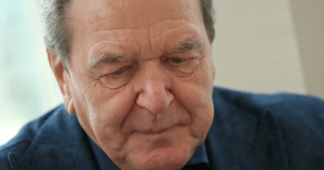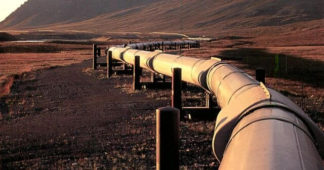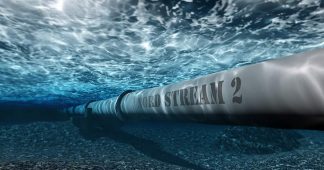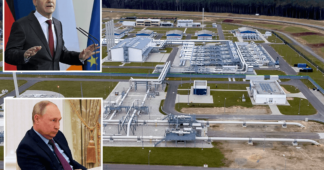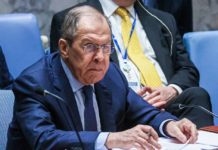The former German chancellor, known in particular for his opposition, along with French President Chirac, to the US invasion of Iraq, said he believes a grain export deal could lead to ceasefire talks.
Former German Chancellor Gerhard Schröder said in a German media interview published on Wednesday that he was in Moscow for talks with President Vladimir Putin last week.
Schröder told the magazine Stern and broadcasters RTL/ntv that he believed the recent deal brokered by the UN and Turkeyto allow Ukrainian grain exports to leave the Black Sea could become the first step towards talks on a ceasefire — even though neither of the warring factions has indicated this.
“The good news is that the Kremlin wants a negotiated solution,” Schröder said in the interview. The Kremlin also later confirmed Schröder’s visit.
Schröder even hinted at the potential shape or terms of such a ceasefire, albeit one that diverges considerably from the government in Kyiv’s stated expectations of recovering its original post-Soviet borders.
“The idea that Ukrainian President Zelenskyy will be able to militarily reclaim Crimea is simply false,” Schröder said of the territory annexed by Russia in 2014, following the toppling of an elected government in Kyiv in a popular uprising.
When it came to the areas currently contested in the Donbas, Schröder both accused Ukraine of failing to keep to the terms of the seemingly-failed Minsk Accords and said he believed the best way to peace for the region would be “a solution along the lines of the Swiss canton model.” Switzerland is divided up into 26 semi-autonomous cantons or provinces.
Gerhard Schröder — former chancellor on Russian energy company boards
Schröder, a Social Democrat and German chancellor from 1998 to 2005, has regained modern notoriety via his contentious positions on the boards of Russian state-owned energy companies. He chairs the board of the Nord Stream pipeline company.
He quit his post on the Rosneft board, following months of pressure, in May.
Schröder also remained close to the Russian line when asked about reduced deliveries via the Nord Stream 1 pipeline that is still operational. Gazprom, Siemens, Russia, Canada, and Germany are in the midst of a dispute over why turbines sent abroad for repairs are yet to return to Russia.
Schröder argued that the fault appeared to lie with Siemens, saying “why it [the turbine] is [at a Siemens’ facility in Mülheim, Germany] and not in Russia, I do not understand.” He went on to say that of five turbines on Nord Stream 1, four were out of service for one reason or another, leading to gas flows at around 20% of their maximum.
When pressed further, with the interviewers suggesting he was “isolated and massively under pressure because of your closeness to Putin,” he asked: “Do I have to jump over every hurdle that is held up in front of me? I’m not like that. I made decisions and I’m standing by them and I have also made clear: Perhaps I could still be of use here again. So why should I apologize?”
Schröder has already mooted that his connections in the Kremlin could be used in a diplomatic drive if desired, which he seemed to suggest once again. Chancellor Olaf Scholz has made clear no such help is desired.
Schröder and Scholz’s party, the SPD, has instead started the lengthy and legally difficult process of trying to expel Schröder since the war in Ukraine broke out. Judging by past cases, involving far less high-profile SPD politicians such as anti-immigration maverick Thilo Sarrazin, it could take a decade or more if Schröder chooses to resist.
Schröder’s staff in the former chancellors’ offices in Berlin also resigned in protest earlier in the year. All former chancellors receive a taxpayer-funded team to maintain a public office in retirement.
How isolated is Schröder in his views?
Schröder alluded to the isolation he’s facing in Germany. He told the outlets that a member of a golf club he goes to in Hanover, “has complained because he has to suffer seeing me every now and again.”
But he went on to claim: “I also get a lot of letters from Germany that say: It’s good that there is still someone who is keeping channels of communication open with Russia in the current conflict.”
In his view, “Germany and the federal government have a special responsibility, especially together with France.”
Schröder also said he was not particularly concerned about facing sanctions, as some have argued he should.
“There are still judges in Germany who can ensure that it doesn’t come to that,” he said, also appearing to suggest that he did not keep all of his assets in Germany, saying he had one account that was “insignificant” with his local Sparkasse bank.
We remind our readers that publication of articles on our site does not mean that we agree with what is written. Our policy is to publish anything which we consider of interest, so as to assist our readers in forming their opinions. Sometimes we even publish articles with which we totally disagree, since we believe it is important for our readers to be informed on as wide a spectrum of views as possible.
